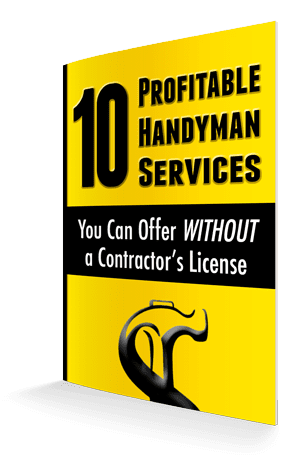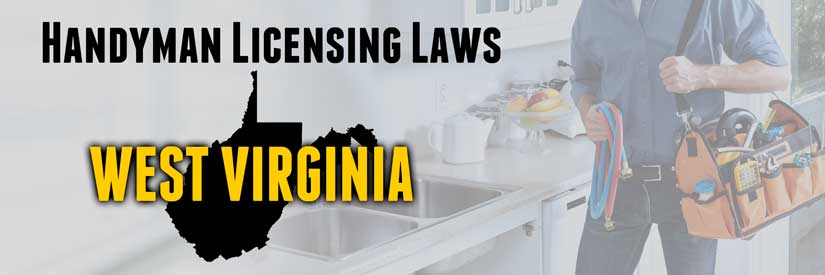If you want to start a handyman business in West Virginia, you must understand the local laws.
In this article, you’ll learn everything you need about licensing laws for handymen in the state.
I’ve poured over pages of difficult-to-understand legal jargon and pulled out the critical information you need before offering handyman services for profit.
Do you need a license to offer handyman services in West Virginia?
A license is NOT needed to work as a handyman in the state. The only requirement to offer small home repairs is that you have a business license.
However, there are restrictions on the size and scope of work an unlicensed handyman can perform. For example, residential building projects costing $5,000 or more or commercial projects costing $25,000 or more require a building contractor license. More on that below.
There are also restrictions on the type of work you can perform. For example, you must have an HVAC license to install, service, or repair heating and cooling systems.
In-depth plumbing work also requires a specialty certification in West Virginia.
While a handyman license isn’t required to work in the state, you’ll need a West Virginia State Tax Business License to operate any revenue-generating business legally. This includes the business activity of a handyman.
Limitations for handymen
Once you’ve obtained your State Tax Business License, you’re ready to go.
Unique to West Virginia is the breadth of HVAC, plumbing, and electrical work you can engage in. Many states prohibit or significantly restrain work in these specialties, while West Virginia offers wide latitude.
Let’s break this down. The clerk I spoke with stated that you can’t alter or repair an HVAC system, but you CAN change filters and clean ducts. She also noted that while you can’t replace water lines or interface with sewer lines/septic tanks, you CAN install fixtures, faucets, and washing machines, and locate and repair leaks. She also indicated that while you can’t replace outlets or repair outdated wiring, you CAN mount a smart thermostat or video doorbell.
With this said, it’s wise to tread carefully with work related to HVAC, plumbing, and electrical, as the laws aren’t clearly documented, and the examples above are one clerk’s input.
For specific answers to what is/isn’t lawful, contact the Division of Labor Contractor Licensing Board at (304)558-7890 or Licensing@WV.gov.
Finally, as referenced earlier, if you wish to take on projects over $5,000, including labor and materials, you’ll need to obtain a general (or building) contractor license.

FREE REPORT: “10 Profitable Handyman Services You Can offer WITHOUT a Contractors License”
Stop waiting and start making money with these 10 profitable services anybody can offer.
Advertising guidelines and restrictions
I was unable to locate restrictions on handyman advertising through my online search, and the clerk I spoke with in the Division of Labor Contractor Licensing Board indicated the only constraint is that the contractor who is advertising must have a valid West Virginia State Tax Business License.
Most states require contractors to include their contractors license with any advertising, but that doesn’t seem to be the case with West Virginia.
However, it still seems like a good idea to include your business license number on any advertisements to avoid trouble.
Penalties for contracting illegally
Working outside laws in place for handymen – whether performing work over $5,000 without a GC license, exceeding parameters for plumbing, HVAC, and electrical work, or contracting without a West Virginia State Tax Business License – places the handyman in jeopardy.
Fines begin at $200 and can escalate to $5,000, including jail time. A breakdown of the penalties is as follows:
- Between $200 and $1,000 for a first offense
- Between $500 and $5,000 and up to six months in the county or regional jail for a second offense
- Between $1,000 and $5,000 and 30 days to one year in the county or regional jail for any subsequent offenses
Bottom line: work within the law. The penalties just aren’t worth it.
Steps for becoming a handyman in West Virginia
While a handyman license isn’t needed, there are steps to take to work legally as a handyman in West Virginia.
To start, you’ll need a West Virginia State Tax Business License, accessible here.
You’ll also need to register with WorkForce West Virginia. This agency determines whether you’ll be required to provide unemployment insurance for employees. You can connect to WorkForce West VA here.
If your handyman business will have employees, Workers’ Compensation insurance is required. This must be obtained through a private insurer. For more information, visit the West Virginia Offices of the Insurance Commissioner Employer Coverage Unit at this link.
Conclusion
West Virginia has one of the most flexible handyman policies out there, with considerable latitude extended to unlicensed handymen compared to other states. As long as you remain within the $5,000 cap per project and get a business license, you’re good to go.
If you aim to undertake large-scale residential jobs, clocking in over $5K (or commercial projects over $25,000), you’ll need a building contractor license.
Either way, this leaves you with plenty of room to start and grow a profitable business.
